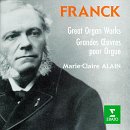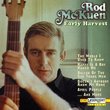The Definitive Franck for Organ
Peter J. Bice | McKinney, TX United States | 04/24/2001
(5 out of 5 stars)
"Marie-Claire Alain's newest recording of Cesar Franck's works for organ is the one by which all others should be compared. We are treated to some of her very best playing...very free and imaginative, and exceedingly interesting. As usual, Mme. Alain has included insightful program and performance notes. It is her playing that provides listeners a deep look into the soul and mind of Franck. The Cavaille-Coll organ at St. Etienne in Caen is superbly recorded, and detailed notes on registrations are provided. You will experience musicianship of the highest order."
Best by far -- if you can find it
Starry Vere | Silver Lake OH USA | 06/19/2005
(5 out of 5 stars)
"Of the recent sets of Franck organ works, the differences are clear enough. Michael Murray is forthright but dull, while Jean Guillou is excitable but so oblivious to the letter of the score, especially in registrations, as to seem daft.
Marie-Claire Alain's performances display her trademark combination of reverence and alertness and she is superbly recorded on the Cavaille-Coll organ of St. Etienne de Caen.
It is by far the best set out there...but that's the problem. It's too far out there, not currently available in the US. One hopes that the Warner Apex budget re-issue that is currently available in Europe and the UK will soon appear here as well."
The Real Deal for Franck Organ...
Starry Vere | 05/24/2004
(5 out of 5 stars)
"Fin-de-siecle Franco-Belgian musique performed by a Frenchwoman on the Cavaille-Coll organ (1884) at St. Etienne, France, issued on the French label Erato: this is the real deal.Bruckner was certainly one of the greatest organists since Bach, but unfortunately he saw not fit to inscribe any of his great works on paper; so, the honor falls to Franck. Interesting note: in the spring of 1869, Bruckner performed Bach on the Cavaille-Coll organ, La Notre Dame de Paris, before Franck and others. Both Franck and Bruckner were devout Wagnerians; undoubtedly they found much to discuss after the concert. Incidentially, Franck's d-minor Symphony draws many aural parallels with Bruckner's oeuvre of Nos. 0-9. May we infer that Franck's organ works likewise draw parallels with Bruckner's improvisations, now lost in the sea of time? Possibly.In addition, Franck's String Quartet and Bruckner's String Quintet share aesthetic topoi: pity we don't have more Bruckner chamber works; fortunately we have Franck's Piano Quintet, Violin/Flute Sonata, and piano works. Perhaps we can hear an echo of Bruckner in them. Oh, yes, let us not forget Franck's oeuvre for harmonium: Bruckner also relished the exquisite timbres and tessitura of the harmonium: he owned a fine instrument, as is seen in the c.1894 photograph of him in his Vienna flat, seated at his Bøsendorfer grande salle piano. The harmonium is directly behind his left shoulder, closed, with the pedals up, and music paper stacked upon it (--by '94, Bruckner was too old and infirm to pump the harmonium any longer). Franck's complete harmonium works performed by Joris Verdin on the Ricercar label (2002) are highly recommended."


 Track Listings (14) - Disc #1
Track Listings (14) - Disc #1

![Seussical [2000 Original Broadway Cast]](https://nationalbookswap.com/cd//m/02/4802/514802.jpg)